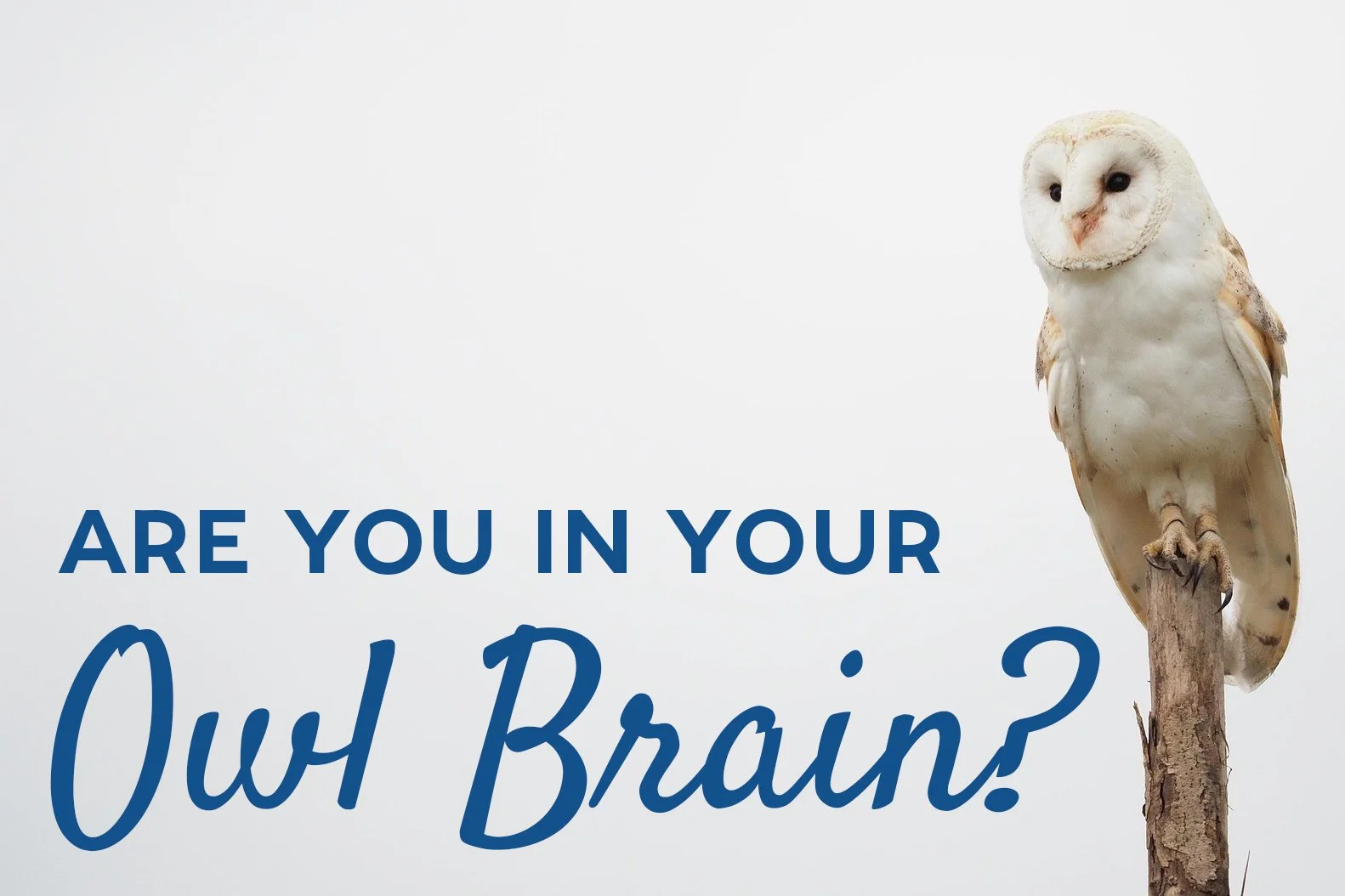Are You in Your Owl Brain?
Join the Project of the Week Community!
Every Thursday, I share a simple yet powerful action, habit, or project to help you boost your health, happiness, and overall well-being.
If you’ve been enjoying the Project of the Week newsletter, I’d love your help in spreading the word! Invite your friends and family to join us on this journey—just click HERE to sign up.
Together, we can create a ripple effect of positivity and growth!
PROJECT OF THE WEEK
Are You in Your Owl Brain? (And what to do when your owl takes off)
We’ve been reading Robyn Gobbel’s Raising Kids with Big, Baffling Behaviors in our house lately, and I’ve gotta say, it’s been a game changer.
One of the most helpful concepts in the book is this idea of the “Owl Brain.” In Robyn’s words, when you’re regulated, thinking clearly, making decisions, and engaging with the world, you’re in your Owl Brain.
But when things start to feel overwhelming, your owl flies away. And suddenly, you’re in your Watchdog Brain (ready to fight or defend), or your Possum Brain (shut down, withdrawn, frozen). These parts of your brain aren't "bad", they're protective. They’re just not where you do your best thinking.
At home, this visual has helped us make sense of big feelings and tricky behaviors. But, maybe not surprisingly, it’s also followed me straight into my work with clients.
Is Your Owl Still in the Room?
When I’m coaching a student, a business owner, or a client working through executive function challenges, I find myself asking (silently, of course):
Is their owl brain still here? Or has it flown off for a bit?
Because the truth is, when something is hard, really hard, our brains go into protection mode. Even if it’s “just” a spreadsheet. Or a reading assignment. Or a pile of receipts.
It’s not about laziness. Or lack of motivation. It’s about regulation.
You can’t plan, problem-solve, or prioritize from your possum brain. You can’t shift your mindset, make good decisions, or feel hopeful when your owl’s in the wind.
Getting Started
Helping the Owl Come Back
The beauty of being a coach is that I get to support the whole person, not just the to-do list.
So if someone’s struggling to make progress, the first step isn’t always pushing harder, it’s noticing what might be making the owl fly away.
Sometimes, it’s emotional stuff. Life stuff. Stress, grief, sleep deprivation, or simply feeling overwhelmed. And in those moments, my role might be just to listen. Other times, we talk about adding support—a therapist, a trusted friend, a better system, more rest.
And sometimes, it’s a skill or task-specific challenge.
If a student is struggling in calculus, and the professor’s explanations just aren’t clicking, it might be time for a tutor.
If a client dreads invoicing every month and it’s always late, maybe a bookkeeper is the right next step.
Because we don’t have to be great at everything. And some tasks, especially the ones that cause stress or shame, might always send our owl packing.
In those moments, it’s not a failure to get help. It’s smart. It’s protective. It’s regulation in action.
Your Owl Brain Deserves Support
So the next time you, or someone you love, hits a wall, try this gentle question:
Where’s your owl? Is it still with you? Or has it flown off for a bit?
And if it’s flown off, what could help bring it back?
A break? A walk? A breath? A plan? A little help? A little hope?
You don’t have to do it all, all the time, from a calm and clear-headed place. But when you recognize where you are, you can choose what to do next.
And that, I think, is the real magic of this work, at home, in business, and everywhere in between.
Ready to Get Started?
If you're feeling excited about putting this strategy into action and could use a little extra accountability and support, the It’s All in the Planning Starter Pak is here to help! Designed to set you up for success, it’s the perfect tool to keep you on track and moving forward.
Let’s make progress together—because great results start with great planning!
A Note from Happy Spaces
Our goal is simple: to add value to your life. If you think this project will be helpful, here are some steps to set yourself up for success:
Estimate how long it will take—then double it. Giving yourself extra time helps reduce stress.
Schedule it on your calendar for the week ahead. Setting a specific date increases follow-through.
Break it up if it will take more than an hour. Tackling it in smaller steps makes it more manageable.
Make a list of every action needed before you start. A clear plan helps keep you on track.
Do what works for you—you don’t have to complete every part, just what adds value to your life.
Find an Accountability Partner—having support makes it easier to stay committed.
We understand that building new habits and systems can be challenging, but you don’t have to do it alone. For additional support, visit HappySpacesBySarah.com and let’s make organizing and planning easier together.
Creating a life you don't need a vacation from! ®
Sincerely,
Sarah Weingarten
Meet Sarah
As the oldest of nine kids with two working parents, I grew up juggling many responsibilities at home. Organization and time management became my lifeline amidst the chaos.
I attended the Cornell Hotel School and pursued my childhood dream of working in the hospitality industry. In 2016, I launched Happy Spaces, combining my passion for structure and efficiency with helping others.
I love working with students to develop essential organizational, time management, and study skills. These skills empower them to reach their full potential, build confidence, and create a future they feel good about.



